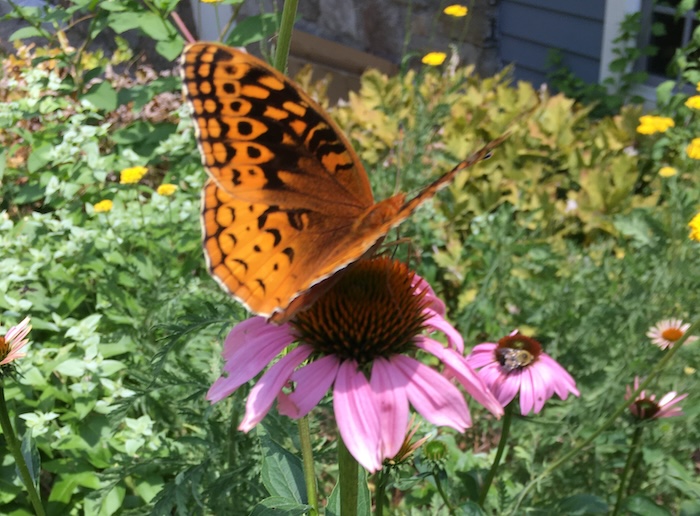It’s not spring without promotional postcards filling my mailbox promising to rid my yard of biting insects. It’s all safe and positively organic, they say; I can enjoy the warm weather free of mosquitoes, ticks and bee stings.
But calling in insecticide sprayers or reaching for the Raid has consequences. Anything in the category of pesticides — which include fungicides, herbicides, rodenticides and insecticides — has impacts beyond their intended use, even if applied according to the label instructions. There’s a build-up of the chemicals in our bodies, homes and yards, as well as the water, soil and air that affect every creature.
My go-to expert on this topic is Jennifer Lerner, a senior resource educator with Cornell Cooperative Extension Putnam County.
What are the big myths about pesticides?
That they are “organic” or kill only certain insects. It’s the story that makes us feel better about using them. When you read the label, the warnings are listed. The landscape owner must advocate for their safety and what’s best in their landscape and not fall prey to irrational fears.
Are pyrethroids (a common class of pesticides) called organic because they are derived from chrysanthemums?
Pyrethroids are not organic. They are synthesized. They have collateral effects on other insects. Nothing is selective, although some pesticides are relatively benign. Manufacturers are required to list all the actions on the label.

Let’s talk about integrated pest management (IPM), which is a way to assess a problem, like an insect eating a desirable plant, and understand possible approaches and risks to humans and the environment. How should gardeners use IPM when it comes to pesticides?
IPM doesn’t forbid pesticides, but it’s a way to set yourself up to use the least amount with the least harm — the right time, the right amount, the right situation, the right conditions. For example, many gardeners use insecticidal soap. But instead of using one pesticide one time, they end up using multiple applications of something less effective. That may do more damage to the environment and the insects we want to protect. [Pamela notes: For more about IPM, see northeastipm.org or cals.cornell.edu/integrated-pest-management.]
Does spraying your yard work against ticks?
There are chemicals that can reduce ticks, but perimeter sprays give you a false sense of security. You need personal protection, too, like permethrin-treated, light-colored clothing that’s tucked in and daily tick checks. You can reduce habitats for ticks, but it’s difficult because there are so many types of ticks and they each thrive in different settings.
Creating tick-free zones is another layer of protection. They can’t live where it’s very dry or where they’re exposed to sun and wind. Short-mown grass is less likely to have ticks. Create a gravel border where kids are active, like around a play set.
What about “tick tubes”?
These are designed to target white-footed mice, which carry ticks, when they build nests. There are also bait boxes in which the mouse goes in and eats bait that has a pesticide that reduces the number of ticks. But now studies are showing a higher incidence of pesticides in birds that nest with fur.
Any tips for how to manage mosquitoes?
Reduce breeding sites by getting rid of standing water. Mosquito dunks are effective in a place where you can’t change the water. In a naturally occurring body of water, there are plenty of predators to keep the population down. Wear long sleeves and pants and use repellents. The federal Centers for Disease Control and Prevention has a list of the most effective (cdc.gov/mosquitoes). Yard sprays are only temporarily effective because mosquitoes fly and are highly mobile. Pesticides that are used for mosquito reduction will have a collateral effect, too.
Why is the collateral effect bad?
Insects are part of this incredible food web. Even the black flies that are out right now are important food sources for migratory bird species. And no, there isn’t anything else for them to eat. We’re seeing a reduction in insect species and we are seeing how this impacts bird species and their resilience. Every time you use a pesticide, you should ask yourself, “Is the effect that I desire important enough to endanger myself and the environment?”

